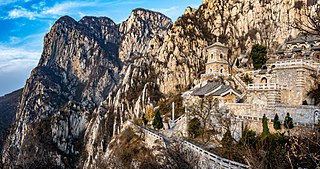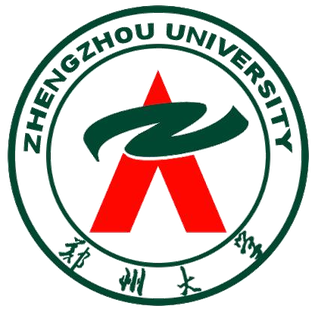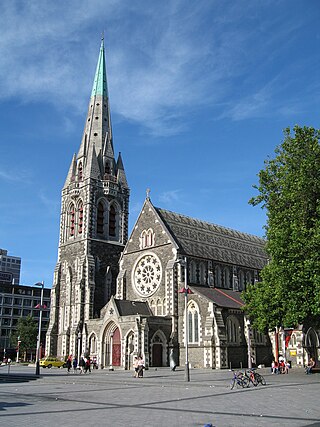Related Research Articles

Henan is a province in Central China. Henan is home to many heritage sites, including Yinxu, the ruins of the final capital of the Shang dynasty and the Shaolin Temple. Four of the historical capitals of China, Luoyang, Anyang, Kaifeng and Zhengzhou, are in Henan.

Kaifeng is a prefecture-level city in east-central Henan province, China. It is one of the Eight Ancient Capitals of China, having been the capital eight times in history, and is most known for having been the Chinese capital during the Northern Song dynasty.

State atheism or atheist state is the incorporation of hard atheism or non-theism into political regimes. It is considered the opposite of theocracy and may also refer to large-scale secularization attempts by governments. To some extent, it is a religion-state relationship that is usually ideologically linked to irreligion and the promotion of irreligion or atheism. State atheism may refer to a government's promotion of anti-clericalism, which opposes religious institutional power and influence in all aspects of public and political life, including the involvement of religion in the everyday life of the citizen. In some instances, religious symbols and public practices that were once held by religions were replaced with secularized versions of them. State atheism in these cases is considered as not being politically neutral toward religion, and therefore it is often considered non-secular.

Zhengzhou University is a provincial public university in Zhengzhou, Henan, China. It is affiliated with the Province of Henan. The university is part of Project 211 and the Double First-Class Construction. Zhengzhou University is ranked 511th in the QS World University Rankings 2025, recognizing it as one of the top global universities.

Christ Church Cathedral, also called ChristChurch Cathedral and (rarely) Cathedral Church of Christ, is a deconsecrated Anglican cathedral in the central city of Christchurch, New Zealand. It was built between 1864 and 1904 in the centre of the city, surrounded by Cathedral Square. It became the cathedral seat of the Bishop of Christchurch, who is in the New Zealand tikanga of the Anglican Church in Aotearoa, New Zealand and Polynesia.

Christianity has been present in China since the early medieval period, and became a significant presence in the country during the early modern era. The Church of the East appeared in China in the 7th century, during the Tang dynasty. Catholicism was one of the religions patronized by the emperors of the Mongol-led Yuan dynasty, but it did not take root in China until its reintroduction by the Jesuits during the 16th century. Beginning in the early 19th century, Protestant missions in China attracted small but influential followings, and independent Chinese churches were also established.
Freedom of religion in China may be referring to the following entities separated by the Taiwan Strait:

Larung Gar in the Larung Valley is a community in Sêrtar County of Garzê Tibetan Autonomous Prefecture, in Sichuan, China, known as Kham. Larung Gar is the local name for the community of mostly Tibetan and Han Chinese students which grew around the Serta Larung Five Science Buddhist Academy, founded in 1980 by Kyabje Khenchen Jigme Phuntsok. The residents are monks, nuns, vow holders and lay people. Larung Gar was considered the largest Buddhist monastic center until demolitions by the Chinese government recommenced in July 2016.
There are no known official statistics of religions in North Korea. Officially, North Korea is an atheist state, although its constitution guarantees free exercise of religion, provided that religious practice does not introduce foreign forces, harm the state, or harm the existing social order. Based on estimates from the late 1990s and the 2000s, North Korea is mostly irreligious, with the main religions being Shamanism and Chondoism. There are small communities of Buddhists and Christians. Chondoism is represented in politics by the Party of the Young Friends of the Heavenly Way, and is regarded by the government as Korea's "national religion" because of its identity as a minjung (popular) and "revolutionary anti-imperialist" movement.

Angola is a predominantly Christian country with Islam being a minority religion. As of 2014 census, there are 195,000 Muslims in Angola, representing less than 1% of total population. Most Muslims in Angola are Sunni. They are generally foreign migrants from West Africa and the Middle East, although a few are local converts. There exist several Islamic organizations that run mosques, schools and community centers. The Association of the Development of Islam in Angola is the primary proselytizing organization. Muslim Angolans are represented by the Supreme Council of Angolan Muslims of Luanda. As of 2020, the Angolan government does not legally recognize any Muslim organizations; as a result, mosques in the country have faced restrictions and many have been shut down by the government.

Batu Arang is a town in Gombak District, Selangor, Malaysia, that is located about 50 km from the capital Kuala Lumpur. Coal was first discovered in the region in 1908, when British authorities found large deposits of coal reserves that could be commercially viable and fuel a railway system. The town was established when the British started mining operations. In 1915, a railway system linking Batu Arang and Kuang was built to transport coal to the rest of the country. As coal output and demand increased, rail services to and from Kuala Lumpur expanded. The demand for coal from Batu Arang skyrocketed due to the First World War, which led to a reduction of coal imports. The local coal was frequently sold to the railway companies, power stations, tin mines, dredges, and end customers.

Christianity has been in Hong Kong since 1841 when British Empire started to rule Hong Kong.
Significant doctrinal and diplomatic developments involving the Holy See and Chinese Catholics occurred during the Papacy of Pius XII (1939-1958). The Vatican recognized Chinese rites in 1939, elevated the first Chinese cardinal in 1946, and established a Chinese hierarchy.
Laoyachen is a subdistrict, formerly town, of Huiji District in Zhengzhou, Henan, China.

Zhengzhou Metro is a rapid transit rail network serving urban and suburban districts of Zhengzhou, the capital city of Henan province. It is operated by the state owned Zhengzhou Metro Group. As of December 2024, the network has 13 operational lines, with a network length of 450 km (279.6 mi) and 217 stations. Opened on 28 December 2013, it is the first metro system in Henan province, and 18th in mainland China.

Chen Quanguo is a Chinese retired politician who was the Chinese Communist Party Committee Secretary of Tibet Autonomous Region from 2011 to 2016 and of the Xinjiang Uyghur Autonomous Region from 2016 to 2021, making him the only person to serve as the Party Secretary for both autonomous regions. Between 2017 and 2022, he was a member of the 19th Politburo of the Chinese Communist Party and was also Political Commissar of the Xinjiang Production and Construction Corps concurrently with his position as Xinjiang Party Secretary.
Sanjiang Church (三江基督教堂) was a Christian church located in Yongjia County, near Wenzhou, in Zhejiang Province, China. The church was completed in December 2013. The city of Wenzhou is a port city believed to have China's largest Christian community. Local Christians claim as many as 15 percent of the residents Christians with the majority being Protestant. British missionaries George and Grace Stott had set up churches in this area towards the end of the 19th century.

Antireligious campaigns in China are a series of policies and practices taken as part of the Chinese Communist Party's official promotion of state atheism, coupled with its persecution of people with spiritual or religious beliefs, in the People's Republic of China. Antireligious campaigns were launched in 1949, after the Chinese Communist Revolution, and they continue to be waged against Buddhists, Christians, Muslims, and members of other religious communities in China.
Golden Lampstand Church was a Christian church located in Shanxi Province, China. It was one of the country's largest Protestant evangelical churches until Chinese police officers demolished it on January 9, 2018, using heavy machinery and dynamite.
True Jesus Church was a church building which was located in the town of Caidu in Shangcai County which is under the jurisdiction of the city of Zhumadian and located in Henan province in the People's Republic of China. The large church building was destroyed by Communist Party officials in 2019. Of China's 23 provinces, Henan province has had the highest percentage of Christians since 1999.
References
- 1 2 3 "China demolishes government-run church after 7-year standoff". Fox News . 2020-07-01. Retrieved 2020-07-29.
- 1 2 "China: 200 communist officials demolish church, beat Christians". 2020-06-27. Retrieved 2020-07-29.
- 1 2 "Zhengzhou: Sunzhuang Christian Church doorway blocked by debris for second time". 2013-08-15. Retrieved 2020-07-29.